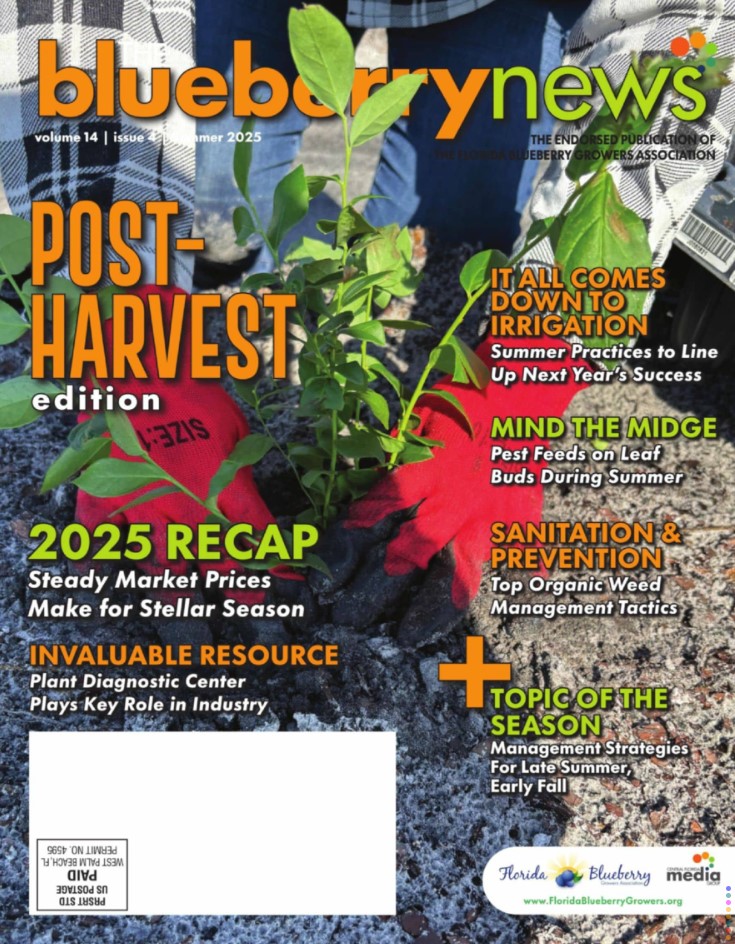Mar
12
With Jeanette Klopchin, Pollinator Protection Specialist, Division of Agricultural Environmental Services, FDACS

photo by SARAH ASCHLIMAN
At the Florida Blueberry Pollination Workshop held on December 2, 2015 at the Lake County UF/IFAS Extension office, Pollinator Protection Specialist Jeanette Klopchin was one of the key presenters discussing practical issues concerning honey bees. The Q&A below provides a few important takeaways from the workshop.
- Could you tell growers a little about your role with FDACS?
- As a pollinator protection specialist, I work for the Division of Agricultural and Environmental Services and also very closely with the Division of Plant Industry Apiary Section. My primary job is to promote communication and professional relationships between beekeepers, growers, and pesticide users. I am also facilitating the development of Florida’s Managed Pollinator Protection Plan. This plan addresses practical issues that both growers and beekeepers face when using pesticides. This plan is just one way we are working to improve direct communications between these parties so all can be successful.
- What are some of the main issues surrounding honey bees that blueberry growers should be aware of?
- Like many crops in Florida, blueberries require bee-pollination to set fruit. In many cases, growers hire managed hives from a commercial beekeeper during bloom for pollination. At the same time, blueberry growers face insect, mite, disease, and weed pressures that can be controlled using pesticides. Many of today’s pesticides can pose risks to honey bees. Therefore, the issue facing blueberry growers, and other growers, is how to balance these two needs: the protection of honey bees and the necessary usage of pesticides.
- Can you describe some of the pesticide labeling changes coming down the pipeline in regards to use and honey bees?
- EPA has proposed revised label language that more precisely defines the circumstances of when pesticides can be used and consequently provide better protection of managed honey bees. This effort is initially concentrating on labeling for products that are considered acutely toxic to bees. You can find more information on this topic on the EPA website: https://www.epa.gov/pollinator-protection.
- Can you list a summary of some of the important takeaways from the workshop?
- Here are some considerations for blueberry growers that were discussed:
- Consider using a written contract for pollination services
- Communicate your pesticide use schedule with contracted beekeepers
- Be aware of apiaries that may be nearby your farm
- Carefully time the placement and removal of hives relative to bloom
- Consider the pollination requirements of your crop and recommended stocking densities— plan the appropriate amount of hives per acre
- Consider additional ways to reduce the risk of pesticides to bees, such as using less toxic formulations or altering the timing of application to when bees are not foraging. For more information, review this document: ifas.ufl.edu/in1027
- Make sure to exchange emergency contact information with contracted beekeepers and keep it on-hand, in the case that an emergency application must occur
- In regards to contracts communication, what should growers take into consideration?
- A sample contract has been produced between the UF/IFAS and FDACS for your reference. You can view it here: ifas.ufl.edu/aa169. Growers can also use the department GIS-based map to see if other beekeepers may be in the area.
- Please share anything else from your presentation and / or notes that you believe would be relevant as a good resource for blueberry growers.
- The department is developing outreach presentations and materials to educate growers, beekeepers, and applicators. The department is also developing a label interpretation document that helps interpret bee-statements on products used in Florida blueberries. You can get more information at org. We appreciate feedback from stakeholders on current resources and future needs. We have had several stakeholder meetings and outreach events. If a grower is interested in participating, I would be happy to provide more information.
Share this post:





